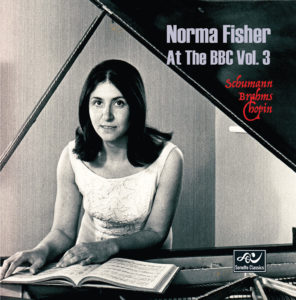Norma Fisher’s active performing and broadcasting career stopped in the 1990s with the onset of focal dystonia in her right arm, forcing the British pianist to refocus her career on teaching. Her remarkable pianism and musicianship survive in a small yet significant number of live radio and concert transmissions (she made no commercial recordings). Sonetto Classics’ first two Fisher BBC releases received justifiably rave reviews; the 1984 and 1992 broadcast performances featured on Volume 3 prove equally compelling.
Everything she touches has an innate sense of proportion and flow, abounding with color, nuance, imaginative yet never capricious voicings, and individuality. Her interpretation of Schumann’s Papillons comes characterfully alive in every movement, from the flexible lilt in Nos. 1, 8, and 10 to the pianist’s amazingly supple staccato touch in No. 9. It easily takes a rightful place alongside classic versions from Alfred Cortot, Wilhelm Kempff, and Murray Perahia.
In Brahms’ Op. 116 group, Fisher rightly emphasizes No. 1’s “energetico” directive rather than weighing it down as many pianists do. By contrast, No. 2’s spaciously unfolding outer sections bracket a central episode that’s shaped with the utmost poetry and delicacy. Fisher’s No. 3 is appreciably full-bodied without ever sounding thick or upholstered, while she sets forth No. 4’s intimate polyphony as if her fingers were members of a seasoned string quartet. No. 5’s phrase groupings are shaped in a way that the rests speak as well the notes, while Fisher’s No. 6 amounts to a master class in timing, tempo, and dynamic scaling.
Among the 1992 Chopin selections, the Berceuse’s beautiful tracery and the Nocturne’s gorgeously pedaled section stand out. Portions of the C-sharp minor Op. 41 No. 1 Mazurka sound slightly inhibited, in contrast to the C major Op. 68 No. 1’s earthy thrust, not to mention the Ecossaises’ elegant playfulness.
The booklet includes a lovely interview between Fisher and Jessica Duchen, plus biographical and technical notes from producer Tomoyuki Sawado. In retrospect, Fisher views the survival of her recordings as a gift, and piano lovers owe her gratitude for sharing them with the world.
































